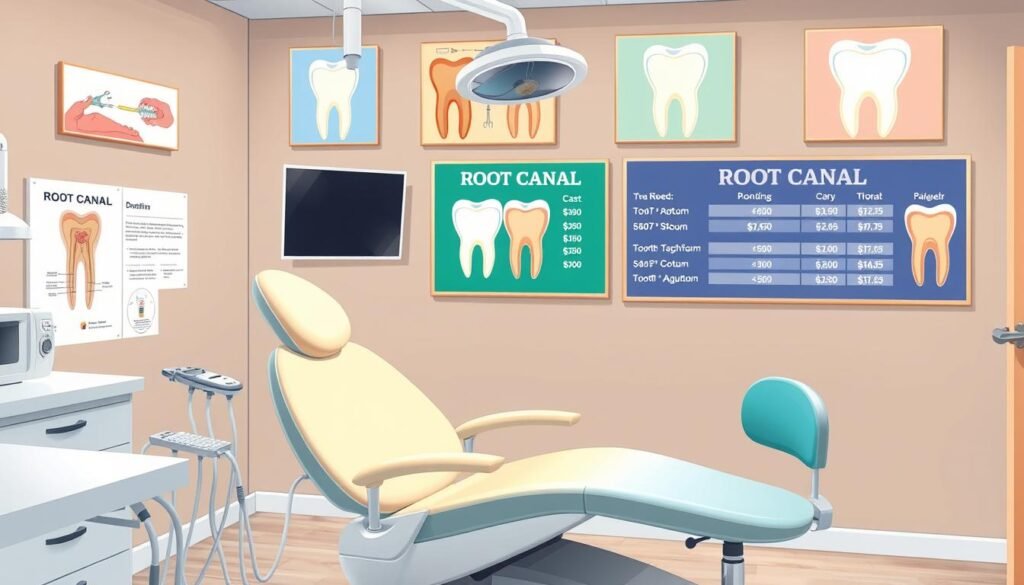A root canal cost without insurance typically ranges $700 to $1,600 per tooth, depending on tooth type, complexity, and location. Here’s the full breakdown and practical ways to save on root canal and crown expenses (U.S. dollars, 2024–25 estimates).
Dealing with a root canal can be stressful, especially when you’re worried about the cost. Understanding how dental insurance, in-network pricing, and affordable options (dental schools, discount plans, payment plans) affect your out-of-pocket expense helps you plan and avoid surprises. Estimate your cost below — or contact your insurer for a pre-determination using codes like D3310/D3320/D3330.
Table of Contents
ToggleKey Notes;
- Cost without insurance: A root canal typically costs $700–$1,600 per tooth. With a necessary crown, the total often rises to $1,200–$2,000.
- Cost variation: Prices vary by tooth type. Front teeth are usually cheaper, while molars are more complex and cost more.
- Insurance impact: Dental insurance and in-network providers can significantly cut costs. Many plans cover roughly 50% of major procedures like root canals.
- Plan details matter: Know your deductible and annual maximum (common caps are $1,000–$2,000), as these will limit how much your insurance will pay.
- Additional costs: Expect extra fees for X-rays, sedation, and especially the crown. Always factor these into the total treatment cost.
- Ways to save: Consider more affordable options such as dental schools, discount plans, CareCredit, or payment plans offered by dental offices.
Understanding Root Canal Treatment
Many people ask, what is a root canal? Plainly put: a root canal is a dental procedure that removes infected or damaged pulp inside a tooth to stop pain and save the natural tooth. Typical steps are diagnosis (exam + X‑ray), cleaning and shaping the canals, filling/sealing, and then a restorative step (often a crown).
What Is a Root Canal?
A root canal removes infected pulp from inside the tooth and seals the space so the infection can’t return. The goal is to preserve your natural tooth and avoid extraction. According to the American Dental Association and endodontic guidance, the procedure is standard care for pulp infections and has a high success rate when done promptly.
Delaying treatment can lead to spreading infection, abscess, and ultimately tooth loss — which usually increases total costs compared with treating the tooth early.
Common Reasons for Needing a Root Canal
Root canal therapy is commonly needed for reasons such as:
- Deep tooth decay that reaches the pulp
- Repeated dental procedures weakening the tooth
- Large or failing fillings that let bacteria in
- Cracks or fractures that expose the pulp
- Trauma to the tooth (sports injury, accident)
If you notice severe tooth pain, prolonged sensitivity to hot/cold, swelling, or a darkened tooth, see a dentist promptly to limit treatment complexity and cost.
| Type of ToothAverage Cost Without Insurance (U.S., 2024–25)Typical Out-of-Pocket After Insurance | ||
| Incisors / Canines (Front Teeth) | $600 – $900 | $120 – $450 (depends on coverage) |
| Premolars (Bicuspids) | $700 – $1,100 | $140 – $550 |
| Molars (Back Teeth) | $900 – $1,600 | $180 – $640 |
Notes: these ranges combine clinic fee surveys and insurer cost breakdowns (ADA fee data, Dental Economics, and insurer examples). Actual out-of-pocket depends on whether your plan classifies the service as basic or major, your deductible, and annual maximums. As an insurance practitioner with 15+ years’ experience, I’ve observed front teeth run cheaper because they usually have fewer canals; molars often have 3+ canals, take longer, and therefore cost more in clinician time and lab fees.
Factors Influencing Root Canal Costs
(See authoritative explainer videos from the American Association of Endodontists or Healthline for procedure details.)
Knowing what affects root canal cost helps you estimate your out-of-pocket expense. Several factors matter: the type of tooth, the complexity of the canal, whether an endodontist or general dentist performs the work, and your geographic location.
Type of Tooth Affected
The tooth needing treatment is one of the biggest drivers of cost. Front teeth (incisors and canines) usually cost less because they often have a single canal and are easier to access. Premolars are moderately more complex. Molars are the most expensive—often $900–$1,600—because they typically have multiple canals (2–4), tighter access, and more operating time.
Location and Complexity of the Procedure
Where you live affects fees: metropolitan areas and regions with higher living costs typically charge more than rural markets. The complexity of the root canal—curved canals, previous root canal failures, blocked or calcified canals—also raises the price.
Retreatment or root canal retreatment (re‑treatment) commonly increases the cost compared with a primary treatment—clinics report higher lab, imaging, and chair-time requirements (re-treatment can add a meaningful percentage to the bill depending on the case).
- Factors at a glance: tooth location (front vs. back), number of canals, provider type (endodontist vs. general dentist), imaging required (2D vs. CBCT), anesthesia or sedation, retreatment history, and patient medical complexity.
- Provider difference: endodontists often charge more than general dentists for complex molar work but may have higher success rates on difficult canals.
Expert tips: Treat painful, infected teeth promptly—delaying typically increases treatment complexity and total treatment cost. When getting estimates, ask whether the price includes imaging, possible post/core, and a crown so you can compare total treatment cost accurately.
| Type of ToothAverage Cost Range (U.S., 2024–25)Complexity Level | ||
| Front Teeth | $600 – $900 | Low |
| Premolars | $700 – $1,100 | Moderate |
| Molars | $900 – $1,600 | High |
Overview of Typical Root Canal Costs
Finding out how much a root canal costs can be confusing. For U.S. patients without dental insurance, a root canal typically ranges from about $600 to $1,600 per tooth depending on tooth type and complexity; factor in a crown and total treatment often reaches $1,200–$2,000. These estimates are compiled from ADA fee surveys, Dental Economics reports, and insurer cost breakdowns (U.S., 2024–25).
Average Costs Without Insurance
The root canal cost without insurance depends primarily on whether the tooth is an anterior (front), premolar, or molar. Typical ranges (U.S.):
| Tooth TypeAverage Cost (Without Insurance) | |
| Front Teeth (Anterior) | $600 – $900 |
| Premolars (Bicuspids) | $700 – $1,100 |
| Molars (Back Teeth) | $900 – $1,600 |
Additional procedure costs may include a consultation or exam ($50–$200), simple X‑rays ($25–$75) or a CBCT ($200–$750) if needed, and restorative materials. Sedation or complex anesthesia is sometimes extra (ranges vary widely); many offices include local anesthesia in the procedure fee but charge separately for conscious sedation or IV sedation.
Estimated Costs with Insurance Coverage
With dental insurance, your out-of-pocket drops based on coinsurance, deductibles, and annual maximums. Common coverage scenarios:
| Plan ExampleTypical CoverageEstimated Patient Cost (Example) | ||
| Basic plan (major services 50%) | 50% after deductible | Front tooth $300–$450; Molar $450–$800 |
| Generous plan (major services 80%) | 80% after deductible | Front tooth $120–$180; Molar $180–$320 |
| No insurance / discount plan | 0% / negotiated discounts | Full cost: see table above or discounted rate |
Example case: a Texas patient paid $1,200 for a molar root canal and an additional $900 for a crown — total $2,100 without insurance. With a plan that covers 50% for major services after deductible, that same patient’s out-of-pocket might be roughly $1,050 (plus any deductible). Always ask your dentist for a detailed estimate and request a pre-determination from your insurer using procedure codes (D3310, D3320, D3330) to get a clearer projected patient responsibility.
How Dental Insurance Covers Root Canals

Dental insurance can significantly lower the cost of a root canal, but exactly how much depends on your plan. Coverage varies by insurer, plan tier, and whether the procedure is classified as a basic or major service. For reliable planning, always check your policy and request a pre-determination from your insurer.
Coverage Percentage and Types of Plans
Many plans split services into preventive, basic, and major categories. Root canals are commonly treated as a basic or major service and are often covered between about 40% and 80% after any deductible. Example: some employer plans pay 50% for major services while more generous plans cover up to 80%.
Important: waiting periods, service classifications, and in‑year benefit stage (year 1 vs. year 2+) can change coverage. Check your insurer’s benefit booklet or sample plan documents (e.g., Aetna, Delta Dental, UnitedHealthcare) for specifics.
Understanding Deductibles and Annual Maximums
Deductibles and annual maximums directly affect patient costs. Many plans have annual maximums in the $1,000–$2,000 range; once the cap is reached, the plan pays nothing more that year. Deductibles must be met before coinsurance applies, and some plans apply different deductibles for major services.
Practical example: if your plan has a $1,500 annual maximum and you already used $800 earlier in the year, only $700 of coverage remains toward a root canal and crown—expect higher out-of-pocket in that case.
In‑Network vs. Out‑of‑Network Providers
Using an in‑network provider usually lowers your costs because insurers negotiate discounted rates with those dentists. Out‑of‑network dentists may charge their full fee, and the insurer will reimburse based on its allowed amount—leaving you to cover the balance (balance billing).
Expert tips (from 15+ years in insurance): watch for waiting periods (commonly 6–12 months) on new policies—major procedures like root canals are often excluded until the waiting period ends. Always request a written pre-determination and ask your insurer to confirm whether the crown is covered and how it’s classified.
| Plan ScenarioCoverage ExampleSample Patient Cost on $1,200 RCT | ||
| Plan A (50% major, $1,500 annual max) | 50% after deductible | Patient pays ~$600 (plus any unmet deductible) |
| Plan B (80% major, $2,000 annual max) | 80% after deductible | Patient pays ~$240 |
| No insurance / discount plan | 0% / negotiated discount | Patient pays full fee or discounted rate (e.g., $900–$1,200) |
Before treatment, call your insurer with the procedure codes (D3310/D3320/D3330) and ask for a pre-determination of benefits and an estimated patient responsibility. This checklist step often prevents surprise bills.
Root Canal Cost with Insurance
Dental insurance can substantially lower the cost of a root canal, but exactly how much you pay depends on plan details, deductibles, and annual maximums. Typical U.S. root canal fees range from about $600 to $1,600 per tooth; with common insurance coverage you might see out-of-pocket costs roughly from $150 to $750 depending on network and whether a crown is required.
How Insurance Affects Your Out-of-Pocket Expenses
Plans differ widely: some classify root canals as major services and cover ~50% after a deductible, while more generous plans pay up to ~80% (after waiting periods or deductibles). Other costs—consultations, X‑rays, and crowns—may be billed separately and affect your final patient responsibility.
Expert note (15+ years in insurance): typical out-of-pocket ranges I’ve seen are about $150–$750 for most root canal cases after insurance, but expect higher OOP if a crown is required or your annual maximum has already been used.
Case Study: Coverage Scenarios by Location
Below are illustrative examples to help estimate likely costs. These are sample scenarios — always request a pre-determination from your insurer using codes D3310 (molar), D3320 (premolar), D3330 (anterior) for exact figures.
| LocationWithout InsuranceWith Typical Plan (50%)With Generous Plan (80%) | |||
| Massachusetts (example) | $940 – $1,240 | $470 – $620 | $188 – $248 |
| Texas (example) | $650 – $860 | $325 – $430 | $130 – $172 |
Use the table to estimate your out-of-pocket, then contact your insurer and dentist with the procedure codes above to get a written pre-determination and a detailed cost estimate. That step significantly reduces billing surprises.
Common Additional Costs Associated with Root Canals
Root canal treatment often involves extra procedures that add to the total cost — it’s important to budget beyond the core procedure. Common additional costs include diagnostic imaging, posts/cores for weakened teeth, and the crown that restores function and strength.
The Cost of X‑Rays and Diagnostic Imaging
X‑rays are essential for planning and confirming successful root canal treatment. Typical imaging costs (U.S.):
- Periapical or bitewing X‑ray: $25–$75
- Panoramic X‑ray: $85–$200
- CBCT (3D cone‑beam): $200–$750 when complex anatomy or retreatment is needed
Many dental insurance plans cover at least part of diagnostic imaging, but coverage varies — always confirm with your insurer.
Crowns and Other Restorative Treatments
Most back teeth require a crown after a root canal to protect the tooth. Crowns are often the largest single restorative expense and can double your total treatment cost if you don’t account for them.
| Crown TypeTypical Cost (U.S.)Typical Insurance Help | ||
| Full metal (gold or alloy) | $800 – $1,200 | Often partially covered |
| Porcelain‑fused‑to‑metal (PFM) | $900 – $1,500 | Often partially covered |
| All‑ceramic / zirconia | $1,200 – $2,500 | May be limited by plan |
Expert tips: From 15+ years in insurance, I regularly see crowns be the deciding cost factor when patients weigh extraction vs. saving the tooth. Ask your dentist and insurer whether the crown is preauthorized and how much of the crown cost the plan will pay.
Other possible expenses: post/core placement ($100–$350), temporary crowns ($50–$200), and follow‑up visits. When comparing options, request a written estimate that itemizes imaging, procedure, and restoration costs so you can compare total expenses and financing options.
Strategies for Reducing Root Canal Costs
Root canal treatment can be expensive, but there are practical ways to lower what you pay. Below are vetted options and steps to help you get the care you need without breaking the bank.

Getting a Detailed Cost Estimate
Ask your dentist for a written, itemized estimate that lists procedure codes (D3310, D3320, D3330), X‑rays, anesthesia, posts, and crown costs. A coded estimate lets you request a pre‑determination from your insurer so you know estimated patient responsibility before treatment.
Exploring Dental Savings Plans and Low‑Cost Clinics
If you don’t have dental insurance, consider dental savings plans (discount membership plans) that offer reduced fees without waiting periods. Also check local dental schools and community clinics — dental school treatment can cut costs by 30–70% because supervised students perform the work. Nonprofit clinics often provide sliding‑scale fees based on income.
Payment Options and Financing
Many dental offices offer in‑house payment plans or third‑party financing like CareCredit. Typical CareCredit options include 6–12 month interest‑free plans (subject to credit approval) or longer-term plans with interest. Example: a $1,800 total bill on a 12‑month interest‑free plan = $150/month (if approved).
Other Practical Money‑Saving Tips
- Compare prices: get 2–3 written estimates (general dentist vs. endodontist) — an endodontist may charge more for complex molars but can increase success odds.
- Ask about bundled pricing: some offices offer a single fee that includes RCT + crown at a reduced rate.
- Use FSA/HSA funds where available — eligible dental procedures can be paid pre‑tax from these accounts.
- Negotiate: politely ask the office if they offer discounts for uninsured patients or can stretch payments over multiple months.
Expert tips: From 15+ years in insurance, I recommend requesting a pre‑treatment benefits estimate and verifying whether crowns are covered. Download a cost checklist (questions for your insurer and dentist) to bring to appointments — it helps you compare options and avoid surprises.
Verifying Your Insurance Coverage

Before your root canal appointment, take a few minutes to verify benefits so you’re not surprised by the bill. Calling your insurer and getting a written estimate (pre‑determination) is one of the most effective steps to confirm what your plan will pay.
What to Do Before Your Appointment
Review your plan documents or call your dental insurance customer service. Ask whether root canal procedures are covered, whether there’s a waiting period, and how the plan classifies the service (basic vs. major). Confirm deductible amounts and the remaining annual maximum for the benefit year.
How to Confirm Coverage Details with Your Insurance Provider
Use this short phone script when you call your insurer. Ask:
- “Is a root canal coded as D3310 (molar), D3320 (premolar), or D3330 (anterior) covered under my plan?”
- “Is there a waiting period for major services or root canal treatment?”
- “What is my coinsurance or copay for this procedure, and do I have an unmet deductible?”
- “What is my remaining annual maximum for the plan year?”
- “Will you provide a written pre‑determination of benefits for this procedure?”
Template request: “Please provide a written pre‑determination for procedure codes D3310/D3320/D3330 and list the estimated patient responsibility, including any applicable deductible and annual maximum.”
Expert tips: From 15+ years in insurance, I recommend getting that pre‑determination in writing (email or fax). It reduces claim disputes and helps you compare dentist estimates with the insurer’s expected payment. Also confirm whether the crown after RCT is covered and how it’s classified—crowns are often a separate coverage category.
Conclusion
Root canal costs vary widely by tooth type, procedure complexity, and location — and insurance can significantly lower what you pay. Typical coverage for root canals ranges from roughly 40% to 80% depending on plan rules, waiting periods, and annual maximums, so understanding your benefits matters.
Next steps: 1) Get a written, itemized estimate from your dentist (include codes D3310/D3320/D3330); 2) Request a written pre‑determination from your insurer; 3) Compare estimates from a general dentist and an endodontist; 4) Explore low‑cost options (dental school, discount plans) or financing if needed.
As an insurance professional with 15+ years’ experience, my top recommendation is to secure a pre‑determination and a clear cost checklist before treatment — it reduces surprises and helps you make the best decision for your dental care and budget.
Ready to act? Compare local prices, call your clinic and insurer, or download the article checklist to prepare for your appointment and estimate your out-of-pocket costs.
FAQ
What is the average cost of a root canal with insurance?
With dental insurance, out-of-pocket costs vary by plan but commonly range from about $150 to $750 depending on coverage, deductible, and whether a crown is required. Example: on a $1,200 molar root canal, a plan that pays 50% after deductible would leave roughly $600 to the patient; a plan that pays 80% could leave about $240. (Sources: ADA fee surveys, sample insurer benefit schedules.)
Are root canals covered by dental insurance?
Most dental insurance plans cover part of root canal treatment, but coverage depends on plan rules. Root canals are often classified as “major” or “basic” services and may be covered at 50% on many plans or up to 80% on more generous plans. Waiting periods, annual maximums, and deductibles affect final coverage. (Check your plan documents or insurer website—Delta Dental, Aetna, and UnitedHealthcare publish sample benefit guides.)
How much does a crown cost after a root canal?
Crown costs vary by material: metal crowns ~$800–$1,200, porcelain-fused-to-metal ~$900–$1,500, and all-ceramic/zirconia ~$1,200–$2,500. Insurance may cover part of the crown depending on classification and plan limits; crowns are often the largest restoration expense following root canal treatment. (Source: typical dental fee schedules and Dental Economics.)
What is the cost of a root canal without insurance?
Without insurance, expect roughly: front tooth $600–$900, premolar $700–$1,100, and molar $900–$1,600. Add a crown and total treatment commonly reaches $1,200–$2,000. Regional variation applies—urban areas and coastal regions often cost more. (Ranges compiled from ADA and industry fee surveys.)
What happens if I need a root canal but can’t afford it?
If cost is a barrier, talk to your dentist about payment plans, CareCredit, or in‑office financing; use FSA/HSA funds if available. Consider dental schools (supervised students often offer 30–70% discounts) or community clinics with sliding-scale fees. Dental savings plans (discount memberships) can also reduce fees without waiting periods.
Is it cheaper to pull a tooth instead of a root canal?
An extraction is usually cheaper up front (simple extraction ~$100–$300; surgical/wisdom tooth extraction higher), but long-term costs can be higher if you replace the tooth with an implant or bridge (implants often $3,000–$6,000). Preserving your natural tooth with a root canal + crown often provides better long-term function and value if feasible.
Do all root canals require crowns?
Not always. Front teeth (anterior) sometimes can be restored with a filling if structural loss is minimal, but most posterior teeth (premolars and molars) typically need a crown to restore strength and prevent fracture. Your dentist will recommend the restoration based on tooth structure and bite forces.
Why do molar root canals cost more?
Molars are more complex: they frequently have multiple (2–4) canals, tighter access at the back of the mouth, and more time-consuming cleaning and shaping. Complex anatomy and longer chair time increase the procedure and lab costs, and molars are more likely to require specialist (endodontist) care or retreatment.
Can I negotiate the cost of a root canal?
Yes. Ask your provider for a written, itemized estimate and inquire about discounts for uninsured patients, bundled pricing (RCT + crown), or payment plans. Comparing 2–3 providers (general dentist vs. endodontist) often reveals meaningful price differences.
What’s the cheapest way to get a root canal without insurance?
Cheapest options include dental schools (supervised students), community health clinics, nonprofit dental programs, and dental savings plans. Prices vary by region; dental schools can reduce costs substantially, but may require more appointments and longer timelines.
How do I get a pre-determination or verify coverage?
Request a written pre‑determination from your insurer before treatment. Provide your dentist’s estimate with procedure codes (D3310 for molar, D3320 premolar, D3330 anterior). Ask the insurer to list estimated plan payment, patient coinsurance, any unmet deductible, and remaining annual maximum. Getting this in writing reduces surprise bills. (Tip from 15+ years in insurance.)Understanding Root Canal Treatment.








